What Happens to Your Body During an Orgasm
There’s arguably no better feeling than a toe-curling, spine-tingling orgasm. And research shows that hitting the big O is as good for your physical well-being as it is for your mental mindset: It improves heart function, decreases the risk of cancer, boosts immunity, reduces stress, and increases longevity — not to mention makes you look younger.
Talk about a health and pleasure powerhouse!
But what exactly is happening in your brain and body while you’re totally blissed out?

Brain
That wild and crazy feeling you get during a trip to O-town is a function of changes in your brain. The prefrontal cortex, which is responsible for logical thought, shuts down, and the limbic system, which regulates feelings, takes over. “As a result, you become very animalistic,” Darius Paduch, MD, PhD, director of sexual health and medicine at Weill Cornell Medical College, tells Yahoo Health. “At the same time, dopamine — the reward hormone — surges, giving you intense pleasure.”
Skin
Ever notice how, in the throes of passion, having your hair pulled, nails clawing your back, or bottom smacked feels ohhhh-inducing, and not ouch-inducing? That’s because your pain threshold more than doubles, according to Beverly Whipple, PhD, professor emeritus at Rutgers University and coauthor of The Science of Orgasm. Take advantage of the natural analgesic effect by putting sex on the top of your list when you’re under the weather or achy post-workout.
Eyes
Your pupils dilate when you reach the peak, with their diameter increasing 48 percent, Whipple tells Yahoo Health. Some people might also experience better vision. “Depending on the way your brain is wired, certain people get particularly aroused by either visual, auditory, or tactile cues,” says Paduch. “As a result, if you’re visually oriented, your sight may become keener; whereas if you’re more auditory, your hearing may sharpen.”
Related: The New Rules of Orgasms
Nose
Turns out your sniffer may be your most important sex organ. “People breathe harder during orgasm, which improves your olfactory senses,” Paduch says. Animal studies have found that this allows you to take in more pheromones (chemicals that signal your sexual compatibility to your partner), perhaps giving you clues as to whether the other person is a good match for you.
Mouth and Lungs
A mid-O smooch means you’re swapping serious spit: Most people experience an uptick in saliva production when they climax, thanks to the parasympathetic nervous system (which is responsible for the stimulation of automatic physical responses during sexual activity). For others — particularly men — anxiety about the sexual encounter has the opposite effect: It triggers dry mouth.
At the same time, the parasympathetic nervous system instructs your vocal cords to constrict, leading to that characteristic throaty voice, as well as primal grunts and groans. “You may get a headache or feel lightheaded because you are unable to completely exhale the air in your lungs,” Paduch says.
Heart
It’s true that love — or at least lust — makes your heart race. “On average, blood pressure goes up to 280 and your heart rate soars over 100 BPM [beats per minute],” Whipple says.
Climaxing also gets you hot, literally: Your body temperature and metabolism rise slightly, even if your roll in the hay isn’t particularly vigorous. “This is probably an evolutionary remnant from our primal ancestors, rather than a physiological necessity,” Paduch says. “After all, in many animals, like a horse or elephant, it takes a great deal of energy to thrust during orgasm.”
Related: How I Learned To Orgasm
Chest
While you shouldn’t expect to go from a B- to a D-cup, breasts will become engorged as prolactin (the hormone that stimulates breast milk production) releases during orgasm, Paduch says. Then, your headlights start to shine. “In both men and women, nipples become more pronounced and sensitive, as the nerve endings open up,” Paduch adds.
There’s also science behind the afterglow: “Your parasympathetic nervous system triggers your blood vessels to open, so you have greater blood flow,” Paduch says. “This causes the skin of your upper body to become flushed or marbled.”
Pelvis
In men, the muscles of the lower back, hips, pelvis, and legs tense up from the force used to ejaculate. Simultaneously, the sperm make their way from the testicles through the vas deferens and through the urethral orifice, where they’re expelled as semen. “The muscles at the base of the penis rapidly contract 10 to 14 times over the span of 10 to 15 seconds,” Paduch says. “Men’s legs will often shake as a result of these pelvic contractions.”
Women’s pelvic muscles, on the other hand, actually become more relaxed to allow the penis to fully enter, and the vagina elongates as the cervix and uterus ascend to make more room. During the big O, the vaginal muscles contract seven to eight times, and these contractions last longer than men’s.
As blood flow increases in the pelvic area, the labia, clitoris, and penis swell, since they’re made of spongy, expandable tissue. “The nerve endings, which are usually hidden, move closer to the surface of the skin,” says Paduch. This increased exposure makes the area very sensitive to touch.
Read This Next: The 12 Types of Orgasms — What They Are & How To Have Them
Body-Peace Resolution is Yahoo Health’s January initiative to motivate you to pursue wellness goals that are not vanity-driven, but that strive for more meaningful outcomes. We’re talking strength, mental fitness, self-acceptance — true and total body peace. Our big hope: This month of resolutions will inspire a body-peace revolution. Want to join us? Start by sharing your own body-positive moments on social media using the hashtag #bodypeaceresolution

